Quit Your Stupid Job
Beth Stultz, Dir. of Marketing, Comm. & Education, Pet Sitters International
 Beth Stultz of Pet Sitters International (PSI) wants you to quit your dumb job and become a pet-sitter! She says you can make anywhere between 50,000 to a MILLION a year doing what you love. Beth will tell you how to get started.
Beth Stultz of Pet Sitters International (PSI) wants you to quit your dumb job and become a pet-sitter! She says you can make anywhere between 50,000 to a MILLION a year doing what you love. Beth will tell you how to get started.
Beth tells us that their organization is the world's largest educational association for professional pet sitters. They do two things. They help people who want to get into the pet sitting industry build and grow their business and they also help pet owners find local professional pet sitters.
So can you make money doing this? Beth states that this is probably the most asked question. Her short answer - yes! They conduct a survey every two years, which reflects that the national average salary for a professional pet sitter was around $50,000. This included people who were pet sitting both full time and part time. However, they have many pet sitters who make well over a million dollars annually. It depends upon where you live and how much time you want to invest.
Consider this:
- The American Pet Products Association reports more than $123 billion was spent on pet services including pet sitting and dog walking in the United States last year.
- An IBIS Dog-Walking Services Industry Report indicates the totals spent on pet services could be as high as $11 billion.
- Spending on the pet services category is one of the fastest growing segments of the pet industry.
- For pet lovers seeking to start their own businesses or pursue a second career, this is great news. As part of the growing pet-services industry, professional pet sitting and dog walking offer a career path that is fulfilling, flexible and profitable.
If you are thinking about quitting your job and becoming a professional pet sitter, Beth recommends that you join an organization likes hers, the Professional Pet Sitters Association (PSI).
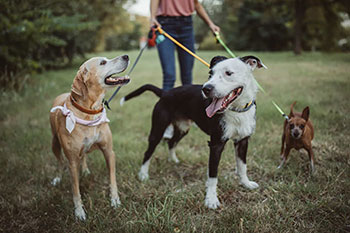 PSI is an educational association, so as an association there is an annual membership. They don't collect any commission from any of the pet sitting assignments. You then have access to the group rate insurance and tons of educational opportunities. They also have monthly webinars, a magazine and free resources and downloads. Their focus is on education for their pet sitters.
PSI is an educational association, so as an association there is an annual membership. They don't collect any commission from any of the pet sitting assignments. You then have access to the group rate insurance and tons of educational opportunities. They also have monthly webinars, a magazine and free resources and downloads. Their focus is on education for their pet sitters.
Along with educational material for pet sitters, they also have a pet sitter locator on their website, which allows pet owners to search for a sitter by zip codes. A potential client is able to see your credentials before contacting you.
Before you start a pet sitting business, you need insurance. Members of PSI have access to group rate insurance. An insurance specifically for professional pet sitters and also a bond is so important for anyone before they accept their very first pet sitting assignment. Rates for insurance vary, but a good estimate is around $300 a year.
Insurance protects you in case a dog you are sitting bites someone, but it is not only just general business liability insurance, it also includes care, custody and control. This means that it covers basically anything that can happen while a pet is in your care. So it not only covers you if the pet bites someone but you are also covered if you break a lamp inside someone's home or if the pet is injured while in your care.
Next, you need a good service contract. For pet sitters, you want to have a contract with your clients so it outlines exactly what you are responsible for, which they then sign.
You can find everything you need to get started at Pet Sitters International.
It is always advisable for people to use a professional pet sitter when leaving their pets. So many pet owners still rely on the neighborhood kid or their neighbor. While those people may have great intentions, they don't have the training or insurance coverage if something were to happen while the pet was in their care.
Visit Website
Dental Disasters
Doc Halligan, Lucy Pet Foundation
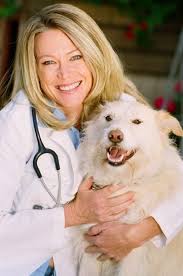 February is Pet Dental Health Month. Do you brush your dog's and cat's teeth on a regular basis? If you don't, you're not alone as most people don't. However, Doc Halligan is one of those people who do.
February is Pet Dental Health Month. Do you brush your dog's and cat's teeth on a regular basis? If you don't, you're not alone as most people don't. However, Doc Halligan is one of those people who do.
Doc Halligan explains that she brushes her cat's teeth on a regular basis after writing a book on the subject. She realized just how important it is to brush your pet's teeth.
Just think if you never brushed your teeth, ever. That is all you need to know.
The American Veterinary Dental Association states that 80-percent of all dogs and 70-percent of all cats have some sort of gum disease before the age of three, if you're not doing anything for their teeth.
If you haven't been taking care of your cat or dog's teeth on a regular basis and your pet is at least 3 years old, there is a good chance that some signs of dental disease are already present, including mouth odor, brown spots and red, inflamed gums. This leads to gingivitis and eventually periodontal disease. As the bacteria destroy the bone, they produce hydrogen sulfide, a smelly gas that causes halitosis.
Those teeth need cleaning immediately! Stop right now and check your pet's teeth. You'll probably be shocked by what you see. Something as simple as brushing your pet's teeth at least three times a week will not only save you hundreds of dollars on vet bills, but will extend your pet's life as well, because not only do neglected teeth look bad, smell bad, and probably hurt, but they can also cause problems including organ failure.
If your pet has excessive tartar buildup, gingivitis, or rotting teeth, chances are you have already waited too long. Good dental care in pets, just like in humans, revolves around controlling the bacteria under the gum line where it isn't readily apparent. Doc Halligan has personally examined dogs and cats whose tartar buildup is so thick, it's literally the only thing holding the teeth in the sockets. When the tartar is finally removed, these teeth actually fall out.
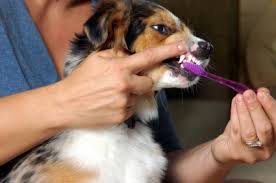 You have to understand that the mouth has a very big blood supply. So if you have bacteria in the gums from neglected teeth, then the billions of bacteria mix with the saliva and harden into tartar. This then eats away at the gum and bone and gets into their blood supply. This blood then circulates through their entire bodies. This bacteria tainted blood goes in their liver, kidneys, lungs and heart causing premature organ failure. Teeth cleaning should be viewed as a way to prevent disease and illness, not to treat it.
You have to understand that the mouth has a very big blood supply. So if you have bacteria in the gums from neglected teeth, then the billions of bacteria mix with the saliva and harden into tartar. This then eats away at the gum and bone and gets into their blood supply. This blood then circulates through their entire bodies. This bacteria tainted blood goes in their liver, kidneys, lungs and heart causing premature organ failure. Teeth cleaning should be viewed as a way to prevent disease and illness, not to treat it.
You should brush your pet's teeth every other day to make a difference. There are certain animals that have risks factors that make them accumulate more plaque. These include older animals and certain breeds of dogs. Small dogs like Poodles, Maltese and Chihuahuas are also predisposed to periodontal disease, because they have such a small mouth.
Another cause of dental disease can be as simple as how a dog chews. Food also matters. If you are feeding cheap, carbohydrate food with sugar in it, that causes more dental disease. It doesn't matter if you feed hard or soft food either, as it all comes down to the sugar content.
Dental care in pets has come a long way. Board Certified Veterinarians are now able to do root canals, crowns and even braces.
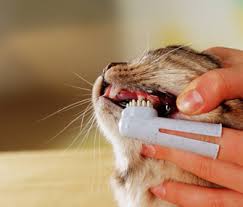 But what about non-anesthesia dental cleaning? Doc Halligan states that this is a VERY DANGEROUS procedure. Just like it states, the animal is awake during this procedure, which is already hard to do. But now you are using instruments to clean the plaque, which scrapes the enamel. This leaves scrapes on the teeth, which are supposed to be smooth, because you are unable to properly polish the teeth on an animal that is awake. So what happens to these scrapes? They will eventually cause the teeth to rot. Doc Halligan states she can always tell when an animal has undergone anesthesia free dental cleanings because of the decay in their teeth. You think you are helping your pet by doing this, but you're not. You're actually better off not doing anything to their teeth if you are thinking about an anesthesia free procedure.
But what about non-anesthesia dental cleaning? Doc Halligan states that this is a VERY DANGEROUS procedure. Just like it states, the animal is awake during this procedure, which is already hard to do. But now you are using instruments to clean the plaque, which scrapes the enamel. This leaves scrapes on the teeth, which are supposed to be smooth, because you are unable to properly polish the teeth on an animal that is awake. So what happens to these scrapes? They will eventually cause the teeth to rot. Doc Halligan states she can always tell when an animal has undergone anesthesia free dental cleanings because of the decay in their teeth. You think you are helping your pet by doing this, but you're not. You're actually better off not doing anything to their teeth if you are thinking about an anesthesia free procedure.
In fact, it is actually outlawed in California unless it is under the care of a veterinarian. Anesthesia Free Dental Cleanings should only be used as a last resort if your pet cannot undergo anesthesia for health reasons.
Dental disease is 100-percent preventable. Doc Halligan says to brush your pet's teeth and it's not as hard as you think!
The Mission of The Lucy Pet Foundation is to reduce pet overpopulation by having mobile spay/neuter clinics across the country and to support causes that benefit animal welfare. The Lucy Pet Foundation currently has two buses that travel around Southern California focusing on spaying and neutering. These buses are state of the art surgery units. Their next focus is in generating more funds to expand the work of these buses and have more across the country.
 The Lucy Pet Foundation not only offers free and reduced spays and neuters, they also do microchipping, vaccines and de-wormings. Spaying and neutering is not only great for pet population control, but it has been proven that an animal will live on an average of 40-percent longer after having this surgery.
The Lucy Pet Foundation not only offers free and reduced spays and neuters, they also do microchipping, vaccines and de-wormings. Spaying and neutering is not only great for pet population control, but it has been proven that an animal will live on an average of 40-percent longer after having this surgery.
Visit Website
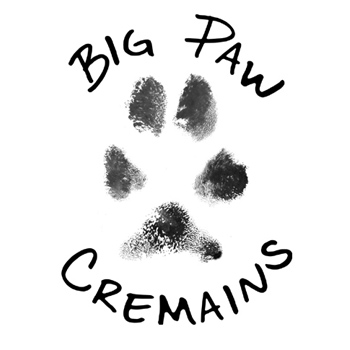 Memorialize Your Pet with Big Paw Cremains
Memorialize Your Pet with Big Paw Cremains
 We've recently lost one of our studio dogs, which hasn't been easy on us. She was with us in the studio for 14 years, and now that she's gone, we still want to keep her close to us and have a little piece of her with us always. There are many ways to honor the lives of our pets, but we were specifically looking for rings, when we came upon Big Paw Cremains. They make all types of jewelry, from rings to necklaces to earring and bracelets, as well as cufflinks and tie tacks, with cremains. They even make figurines. All of their items are hand crafted in Colorado and hypoallergenic. We were particularly interested in their rings, with the cremains inside that you can actually see, so heart warming! We've started the process with Big Paw Cremains, by receiving a collection kit to send back her ashes. They also included the rings, so we could make sure they fit before adding the ashes. We have sent everything back and it was so easy. We are now waiting for the completed product, which should be here in a matter of weeks. We can't wait!
We've recently lost one of our studio dogs, which hasn't been easy on us. She was with us in the studio for 14 years, and now that she's gone, we still want to keep her close to us and have a little piece of her with us always. There are many ways to honor the lives of our pets, but we were specifically looking for rings, when we came upon Big Paw Cremains. They make all types of jewelry, from rings to necklaces to earring and bracelets, as well as cufflinks and tie tacks, with cremains. They even make figurines. All of their items are hand crafted in Colorado and hypoallergenic. We were particularly interested in their rings, with the cremains inside that you can actually see, so heart warming! We've started the process with Big Paw Cremains, by receiving a collection kit to send back her ashes. They also included the rings, so we could make sure they fit before adding the ashes. We have sent everything back and it was so easy. We are now waiting for the completed product, which should be here in a matter of weeks. We can't wait!
Visit Website
The Dangers of Doggie Dragon Breath - Dr. Debbie
 Does your dog's breath cause you to gag and turn away? Are your pet's kisses unwelcome due to fetid breath? Many dog owners recognize that distinctive smell which is often accepted as a condition of dog ownership. But stinky dog breath, while common, is actually a symptom of illness and should not be ignored. Doggie dragon breath, just like a blinking traffic light, is a sign of danger ahead. Don't ignore dog breath for what it is - an indicator of oral infection that if left unchecked will impact your dog's health and shorten his lifespan.
Does your dog's breath cause you to gag and turn away? Are your pet's kisses unwelcome due to fetid breath? Many dog owners recognize that distinctive smell which is often accepted as a condition of dog ownership. But stinky dog breath, while common, is actually a symptom of illness and should not be ignored. Doggie dragon breath, just like a blinking traffic light, is a sign of danger ahead. Don't ignore dog breath for what it is - an indicator of oral infection that if left unchecked will impact your dog's health and shorten his lifespan.
What's the big deal about bad breath? It's more than just the smell. Bad breath, also referred to as halitosis, arises from plaque and oral bacteria. Periodontal disease progresses as plaque accumulates, mineralizes into tartar, and inflammation causes destruction of the supportive tissues around the teeth. Dogs don't simply get cavities, rather they will lose their teeth as connective attachments deteriorate. Untreated dental infections jeopardize the health of nearby teeth and may lead to osteomyelitis - infection in the bone. And with time, untreated periodontal disease showers the bloodstream with bacterial products leading to other diseases such as liver, kidney and heart disease.
Fight Halitosis
The best way to control periodontal disease is to assume an offensive attack. Monitor your pet's oral health by flipping up your dog's lip to discover what is lurking underneath. Look for red inflamed gums, yellow or brown accumulation on the teeth, tooth discoloration, or bad breath. Any symptoms of periodontal disease should be addressed with your veterinarian. Have your pet's teeth cleaned regularly at the veterinary office and follow up with home dental care including daily brushing.
These professional veterinary cleanings are important to safely remove mineralized tartar, clean under the gum line, permit a thorough oral exam and take x-rays. Veterinary dental x-rays are an essential tool in detecting problems and have been shown to identify oral disease in 28-percent of dogs and 42-percent of cats that have an outwardly normal mouth.
Don't fall into the hype about herbal spray-on products or 'awake' dental procedures - these only offer a cosmetic improvement in visible tartar, which only covers a small part of the tooth. These methods, often incorrectly touted as a safe alternative to professional cleanings, can't address the 60-percent of a dog's tooth which lies under the gum line - exactly where periodontal disease brews and does its damage.
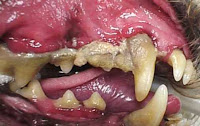 Once you identify that nasty doggie breath, you can be certain some degree of periodontal disease is present and dental intervention is needed. Statistics show that by 3 years of age 80-percent of dogs and cats already have periodontal disease. Don't forget that small and toy breeds of dog have accelerated dental problems diagnosed as young as 1 to 2 years of age.
Once you identify that nasty doggie breath, you can be certain some degree of periodontal disease is present and dental intervention is needed. Statistics show that by 3 years of age 80-percent of dogs and cats already have periodontal disease. Don't forget that small and toy breeds of dog have accelerated dental problems diagnosed as young as 1 to 2 years of age.
Think prevention - have your dog's teeth cleaned and embrace home dental care steps. And the next time you find yourself in a cloud of canine halitosis, you won't turn the other way - you'll grab that toothbrush.
Featured veterinarian known as "Dr. Debbie" on national pet radio program, Animal Radio. Ebook author of "Yorkshire Terriers: How to Be Your Dog's Best Friend"; "Pugs: How to Be Your Dog's Best Friend"; "Mini Schnauzers: How to Be Your Dog's Best Friend"; and "Shih Tzu: How to Be Your Dog's Best Friend." Dr. Debbie's books.
Visit Website
5 Ways to Better Dental Health For Your Pets
Robert Semrow, Animal Radio Listomania
 It's Robert Semrow, your pet world insider here with this week's Animal Radio Listomania.
It's Robert Semrow, your pet world insider here with this week's Animal Radio Listomania.
I've seen plenty of pets whose smile can melt a heart from any distance. I've also seen some pets whose smiles can stop traffic and make them a great candidate for Doggie and Kittie dentures. Who doesn't want to see their pet with a big smile filled with love and happiness? Dental health for your pets is as important for them as it for you. As we've all learned over the years, dental health and the lack there of can impact all the body's systems and cause problems beyond a bad smile.
Here are a few tips to help insure that your pet will enjoy dental health for years to come.
1 - The signs that your dog or cat may be suffering from dental health problems include some or all of the following signs: bad breath, excessive drooling, inflamed gums, loose teeth, lack of interest in food or water, tumors in the gums or cysts under the tongue. If you are seeing any of these signs, talk with your vet and have them do an examination and plan a course of action.
2 - You should regularly check your pet's gums. They should be pink and not showing any injuries or black or white areas. There should be no swelling and no pockets where food can get lodged or stuck. It's important to help your pets feel comfortable with you and/or your pet health partners touching and viewing the insides of their mouths. It's best to start when they are young, but equally important to make it a pleasant experience so they do not associate it negatively.
3 - Have a regular maintenance plan for the dental health of your pet. Speak with your pet health care professionals about what you should be doing and how often you should be doing it. It's important to understand how the food you feed, the treats you give them and the toys your pets play with all impact your pets dental health.
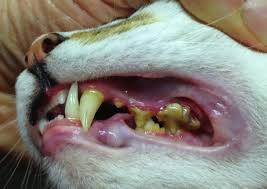 4 - If you are going to brush your pet's teeth do so with a pet safe tooth brush and/or pet safe teeth cleaner. Remember that you should only use pet specific toothpaste as well. If you are uncomfortable about doing this, ask your veterinarian or check with your local pet experts to find out about professional pet teeth cleaning. There are different types of teeth cleaning that are offered these days, some include anesthesia while others don't. Consult your expert to know which is best for your pet.
4 - If you are going to brush your pet's teeth do so with a pet safe tooth brush and/or pet safe teeth cleaner. Remember that you should only use pet specific toothpaste as well. If you are uncomfortable about doing this, ask your veterinarian or check with your local pet experts to find out about professional pet teeth cleaning. There are different types of teeth cleaning that are offered these days, some include anesthesia while others don't. Consult your expert to know which is best for your pet.
5 - Finally, talk with your vet and pet health care expert about toys, treats; chews that can not only help with anxiety and boredom, but can also support the dental health of your pets. Talk with your vet and nutritional pet expert about foods and supplements that can also aid in dental health, as well as digestion support. The body's systems are symbiotic and thus it is important to keep them in balance.
Remember that pets rely on their teeth for not only eating, but also for protection, play and overall health. Dental health impacts everything they do on a daily basis, so an unhealthy mouth cannot only disrupt their eating and drinking behaviors, but also their overall behavior. It's not just about their smile on the outside, but their smile on the inside.
What ways do you provide for your pet's dental health? Share your ideas on how to help with pet dental health on the Animal Radio Facebook Page.
http://petworldinsider.com
Animal Radio News - Lori Brooks
 Prevent Attacks From Wild Animals
Prevent Attacks From Wild Animals
Research out of Spain suggests human carelessness is to blame for roughly half of all large carnivore attacks on people. Scientists with the Spanish National Research Council said many times humans took a careless approach to their time spent outdoors; running while it's dark, leaving children unattended or walking with an unleashed dog. Even worse is approaching a female wild animal with young ones or trying to get close to a wounded animal. The researchers looked at the circumstances surrounding brown bear attacks in one region where in 40 years there had been only 38 reported attacks. Their analysis, detailed in the journal Scientific Reports, suggested NONE of those bear attacks could be attributed to abusive or aggressive behavior on the part of the bear. Education, researchers say, is the key.
Climate Change Doesn't Just Affect Habitats For Wildlife
According to animal experts, climate change is also affecting cats and dogs. They say fleas and ticks are getting smaller. There are more of them, they eat more often, and now those fleas and ticks are causing problems in what used to be the colder winter months. For example, mosquitoes spread Heartworm, but those mosquitoes, which used to be found only in certain colder regions, are now carrying the disease all over the United States. Also, increased temperatures have turned kitten season into a yearlong event instead of a spring ritual. A distinguished professor of entomology at the University of California, Riverside, said environmental conditions are creating larger populations of smaller fleas and ticks that will eat more frequently, develop more rapidly and spread more pathogens.
 99-Year-Old Woman Wakes And Finds Bizarre Animal On Her Chest
99-Year-Old Woman Wakes And Finds Bizarre Animal On Her Chest
Can you imagine! A 99-year-old Florida woman woke up to find a bizarre animal that looks like a cross between a monkey and a raccoon, sleeping curled up on her chest. First responders described it like this: "The lady is sound asleep and she feels something on her chest and she slowly wakes up, and realizes that there's an animal curled up sleeping on her chest… her first impression was it might be a cat, but when they both got a look at each other, then they both freaked out. The lady screamed, the creature, known as kinkajou ran into her attic." A kinkajou is a South American member of the raccoon family that does resemble a monkey. It turned out that the kinkajou belonged to a neighbor but had escaped her home. Kinkajous, sometimes known as "honey bears," are legal to keep as pets in Florida with a special exotic animal permit.
Of All The Cats To Get Lost, This Cat May Not Have Wanted To Be Found
A cat that was missing for more than a year was reunited with his owner after he was found "feasting" in a pet food warehouse in the UK. The cat was found in the warehouse about two miles from his home after repeatedly setting off burglar alarms during the night. Eventually they discovered that the cat was the culprit, but they had a difficult time catching him. They finally caught him and reunited him with his owner who said, "I can't believe he's so porky." Not the usual case for a pet that has been missing for so long.
 Listen to the entire Podcast of this show (#1211)
Listen to the entire Podcast of this show (#1211)





